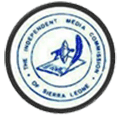|
 |
 INDEPEDENT MEDIA COMMISSION (IMC) INDEPEDENT MEDIA COMMISSION (IMC)
INTRODUCTION:
The Independent Media Commission was established by an Act of Parliament in 2000. The said Act was repealed and replaced by the IMC Act 2020 (Act No. 5 of 2020); being an Act to provide for the continuation of the Independent Media Commission, to provide for the registration and regulation of mass media institutions in Sierra Leone, licensing institutions engaged in radio, television or direct to home digital satellite service broadcasting and registration of persons and institutions engaged in the publication of newspapers, magazines in Sierra Leone and to provide for other related matters.
MISSION
To serve as one of the key pillars of democracy by promoting a free, pluralistic and responsible press, and to protect public interest, while ensuring effective media regulation.
MANDATE
The mandate of the IMC is to register and regulate mass media institutions in Sierra Leone and conduct other matters connected therewith.
FUNCTIONS OF THE COMMISSION
The object for which the Commission is established is to-
- promote a free and pluralistic media industry throughout Sierra Leone;
- ensure that media institutions achieve the highest level of efficiency in the provision of media services;
- promote fair competition among media institutions and persons engaged in the provision of media services;
- protect the interest of the public against exploitation or abuse by media institutions;
- promote communication and media research and development of human resources for the advancement of the media industry throughout Sierra Leone;
- Ensure that every person has access to fair coverage in the print, broadcast and electronic media irrespective of the person's race, colour, sex, religion, ethnicity or political orientation.
CONTACT DETAILS |
Chairman:
Joseph Egbenda Kapuwa Esq.
|
3rd Floor Kissy House,
54 Siaka Stevens Street,
Freetown, Sierra Leone
Email: info@imc.gov.sl
Website: http://imc.gov.sl
Telephone: +232-76-633-882/ +232-76-695-950 |
<<Back>> |
